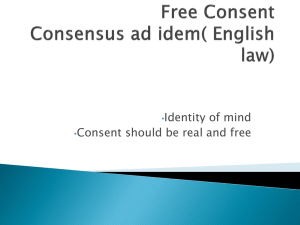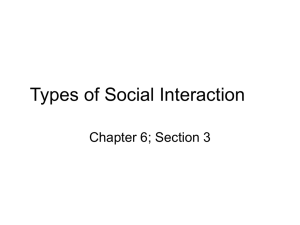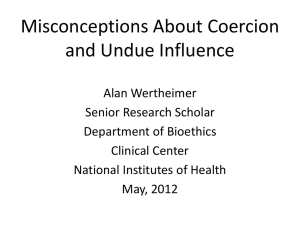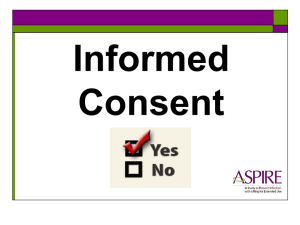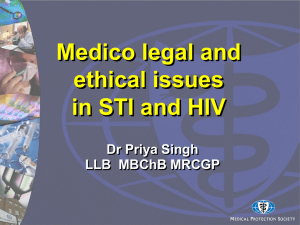Free Consent in Contract Law: Coercion & Undue Influence
advertisement
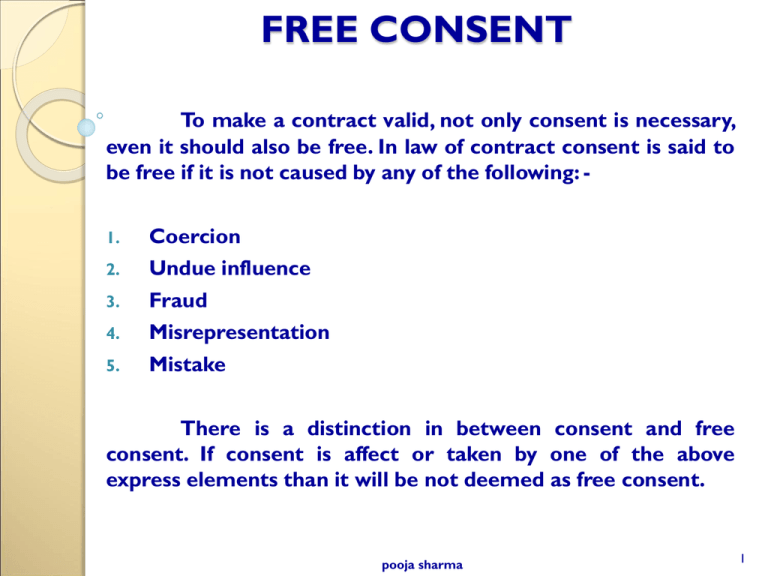
FREE CONSENT To make a contract valid, not only consent is necessary, even it should also be free. In law of contract consent is said to be free if it is not caused by any of the following: 1. 2. 3. 4. 5. Coercion Undue influence Fraud Misrepresentation Mistake There is a distinction in between consent and free consent. If consent is affect or taken by one of the above express elements than it will be not deemed as free consent. pooja sharma 1 Coercion 1. Coercion is the committing or threatening to commit any act which is Unlawful or Threatening to detain any property, of any person, with the Intention of causing any person to enter into an agreement. 2. Examples: - After giving a good beating to A, B makes him to agree to sign a promissory note for Rs 1000. pooja sharma 2 Types of Coercion Threat to commit Suicide:An attempt to commit suicide is an offence and it is also type of coercion. Threat to file a suit. Threat to act some unlawful acts. Threat to detain property of any person. pooja sharma 3 Essentials of Coercion The act must have been done with an Intention of causing any person to enter into an agreement. Coercion can be applied either by a party to the contract or even by a stranger. It may be applied against a party to the contract or any other person. pooja sharma 4 Effect of Coercion When the consent of a party to an agreement is obtained by coercion, the contract becomes voidable at the option of the party, whose consent is so obtained. The burden of proving that the consent was obtained by coercion shall be upon the party who wants to set aside the contract on the plea of coercion. pooja sharma 5 Undue Influence Undue influence is the improper use of any power possessed over the mind of the contracting party. A contract is said to be affected by undue influence when:1. The relations subsisting between the parties are such that one of the parties is in a position to dominate the will of the other. 2. Uses that position to obtain unfair advantages over the other. pooja sharma 6 Undue Influence Continues.. 3. In following three cases law presumes a person to be in a position to dominate the will of the other:- Where one person holds a real authority over the other(Master or servant, parent and child) Where he stands in a fiduciary relationship(religious guru and disciple, trustee and beneficiary, doctor and patient, lawyer and client) Where one person makes a contract with a person whose mental capacity is temporarily or permanently affected by reason of age, illness or mental or bodily distress. pooja sharma 7 Burden of proof To prove that the contract has been affected by undue influence, all the three essentials discussed above must be proved in the order in which they are written. When the first two points are proved in a contract, the burden of proving the use of the dominant position to obtain the unfair advantages will lie on the party in a position to dominate the will of the other. pooja sharma 8 Effect of Undue Influence An agreement caused by undue influence shall be voidable at the option of the party whose consent has been so obtained. pooja sharma 9 Difference between Coercion & Undue Influence Mode of obtaining consent: - In both coercion and undue influence the consent of the aggrieved party is not free. But in the case of coercion the consent of the aggrieved party is taken by committing or threatening to commit an illegal act. While in undue influence the consent of the aggrieved party is obtained by dominating the party by taking an unfair advantage of his position. Type of force: - in case of coercion physical force is exercised while in undue influence, morel force is used. Existence of relationship: - in case of coercion, relationship between the promisor and the promise is not necessary. While in case of undue influence, some sort of relationship must exist between the two parties to the contract. pooja sharma 10
